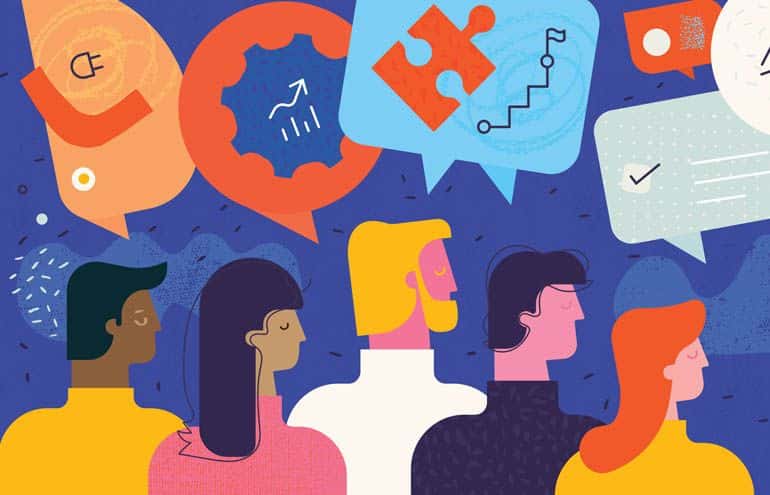Cultural competency refers to the cognitive, emotional and behavioral skills that help you communicate with people from other walks of life. Here are five ways you can increase yours — and open the door to new opportunities.

Table of contents
As demographics in the U.S. change, attorneys may be more likely to encounter people from different cultures and backgrounds who seek (or need) their help to solve legal problems.
According to the U.S. Census Bureau, if you were paired at random with another American, there is a 61.1% chance they would be of a different race or ethnicity than you. That is up from a 54.9% chance in 2010.
While it can be more comfortable to work with clients who look and act like you, attorneys who overlook or fail to market their services to diverse populations are missing a significant untapped market.
“These [potential clients] aren’t getting called back [by many attorneys],” said Iffy Ibekwe, a Texas-based lawyer and wealth adviser who, along with Nkoyo Effiong Lewis, spoke about cultural competency at the 2022 ABA TECHSHOW.
And minority attorneys can’t be the only lawyers serving minority clients, Ibekwe said.
What Is Cultural Competency?
Effiong Lewis describes “culture” as our lived experiences including language, food, traditions, religion, class, race, gender identification, sexual orientation, etc., and the intersection of these things in our lives.
Cultural competency, then, refers to the cognitive, emotional, and behavioral skills that lead to appropriate and effective communication with people of other cultures.
Cultural Competency Is a Must-Have Skill
Effiong Lewis, a legal innovator and director of the State Bar of Georgia’s Law Practice Management Program, also spoke on the topic at the Illinois Supreme Court Commission on Professionalism’s 2023 The Future Is Now: Legal Services conference. Cultural competency is a “must-have” skill for legal professionals who are committed to closing the access to legal services gap, she said, even in traditionally non-diverse communities:
“Now more than ever legal professionals must develop the cross-cultural awareness necessary to provide quality legal services across actual or perceived differences to serve a growing racially and ethnically diverse population.”
But keep in mind that diversity isn’t just about race and gender. It includes a range of human differences, including but not limited to ethnicity, sexual orientation, age, social class, location, physical ability and attributes, religious or ethical values, race, gender identification, and national origin.
Opportunities in Shifting Demographics
While racial and ethnic diversity in the U.S. is increasing, the legal profession isn’t keeping pace.
According to the ABA‘s latest profile of the profession, in 2022, white lawyers made up 81% of the legal profession, compared to roughly 60% of the general U.S. population. Just 4.5% of lawyers are Black (compared to 13.4% of the U.S. population) and 5.8% of all lawyers are Hispanic (compared to 18.5% of the U.S. population).
Combine this data with research that shows up to 80% of the civil legal needs of the eligible population are not being met, and there is a blueprint for culturally competent attorneys to build a highly successful practice.
How Would You React?
Consider this: A person who is multi-racial is looking for a lawyer and finds your website. Based on what they see (e.g., stock images of clients and photos of your team) and read (e.g., language, tone, resources offered), would they conclude you will provide them with the same level of respect you may offer white clients?
How about if you meet a potential client in person and they don’t make eye contact or avoid shaking your hand? Would you view these behaviors as a sign of weakness, insecurity, or even disrespect? Or would you stop and consider the potential cultural significance of their actions?
A diverse client may be more likely to seek out and trust the services of a lawyer who displays diverse clients on their website. Western cultures typically view eye contact as a form of confidence, but some Eastern cultures see it as a sign of disrespect. And observant Muslims and Orthodox Jews refrain from shaking the hand of the opposite gender.
When cultures collide, it’s important to stop and think if the way that you interpret a situation is the only way it can be interpreted, said Effiong Lewis.
How to Increase Your Cultural Competency
During their ABA TECHSHOW presentation, Ibekwe and Effiong Lewis shared five ways attorneys can increase their cultural competency and connect with new communities.
1. Be Curious and Candid
Get clear on the types of services you can provide then ask yourself who else in your community has these needs. Are there groups with limited access to legal services who are getting left behind?
How are you marketing your services to these groups? Does your marketing reflect the communities you’re hoping to serve? For example, people are more likely to seek services if they see their stories mirrored in promotional photos and other materials.
Work on your soft skills. Ask questions and be comfortable saying “I don’t know yet” when you can’t answer a request. It’s OK to invite a client to share their perspective so you can get a better idea of where they’re coming from.
2. Build Community
Seek relationships with other lawyers, legal and business professionals, and members of the communities you aim to serve.
Volunteer or join a local civic organization, become active on community Facebook groups, and learn from those willing to share their culture and traditions.
3. Broaden Your Language
Leave the lawyer-speak in the office and simplify your language. If there is an easier way to say something, do so.
Transcribe documents in languages that your clients can read and understand, offer chatbots in multiple languages, and use easy-to-follow visuals and infographics.
4. Bring in Translators and Translator Services
When communicating with people who don’t use English as their first language, we often revert to speaking slower or louder, which can be disrespectful. Instead, hire a translator for your clients, translate important documents, and research translation management software.
Consider the accessibility of your services for people who are deaf or blind. Would a person with blindness or low vision be able to access the information on your website? Can you use an American Sign Language interpreter for a client who is deaf or hard of hearing?
5. Build Diverse and Inclusive Teams
Diverse teams are 70% more likely to capture new markets, according to Ibekwe and Effiong Lewis. Research shows that workplaces with highly inclusive cultures are more innovative and have 2.3 times more cash flow per employee. So, hire intentionally and cultivate more inclusive workplaces
Inclusivity means providing equal access to opportunities and resources to all people, no matter their race, culture, gender, sex, sexuality, ability, class or other characteristics. But inclusivity also considers things like family, work and caregiver responsibilities. For example, it can be difficult for people with caregiving responsibilities to attend in-person meetings and events after work hours. How can you be more inclusive and work around their schedules?
Acquiring Cultural Competence Requires Patience
Most importantly, be patient with yourself, Ibekwe and Effiong Lewis said. Learn from your mistakes and be prepared to build your cultural competency gradually.
“We want to make sure people can see themselves in the law,” Effiong Lewis said. “And if you can make this happen, there is so much more opportunity in the market you serve.”
Image © iStockPhoto.com.

Sign up for Attorney at Work’s daily practice tips newsletter here and subscribe to our podcast, Attorney at Work Today.
















